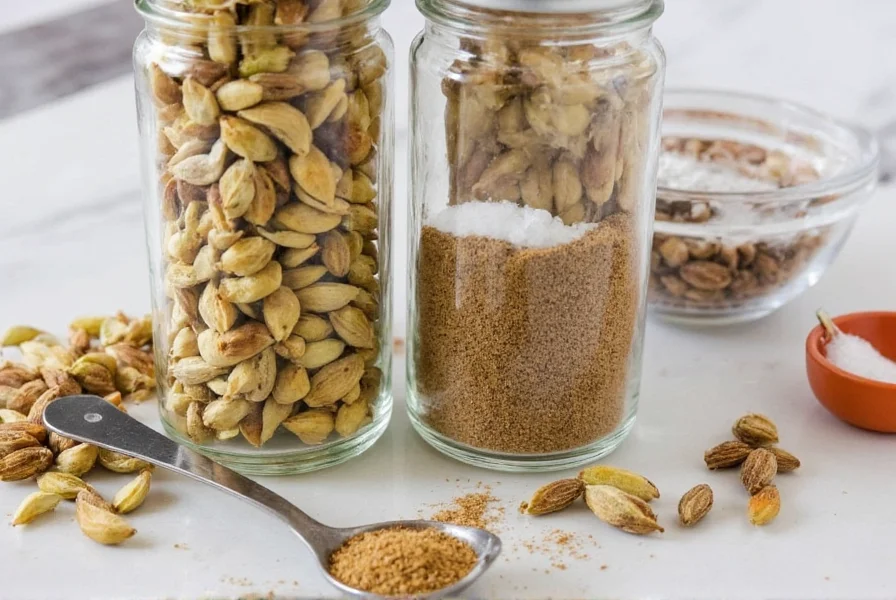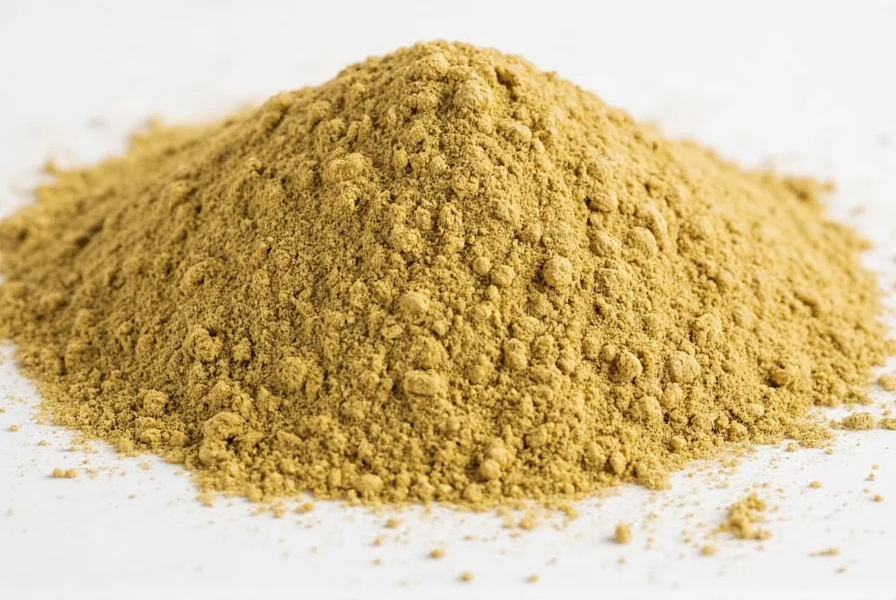What Exactly Is Powdered Cardamom?
Powdered cardamom consists of finely ground cardamom seeds extracted from green or black cardamom pods. Unlike whole cardamom pods that preserve flavor for years, the powdered form offers immediate aromatic release but diminishes in potency within 6-12 months. This spice variant works best when you need quick flavor integration without the extra step of grinding seeds.

Flavor Profile Compared to Whole Cardamom
Understanding the flavor differences between powdered and whole cardamom is essential for recipe success. Powdered cardamom delivers:
| Characteristic | Powdered Cardamom | Whole Cardamom Pods |
|---|---|---|
| Flavor Intensity | Immediate but less complex | Deeper, more nuanced profile |
| Shelf Life | 6-12 months | 2-3 years |
| Best Applications | Baking, spice rubs, quick recipes | Slow cooking, infusions, traditional preparations |
| Flavor Release | Instant | Gradual during cooking |
Optimal Culinary Applications for Powdered Cardamom
Chefs and home cooks choose powdered cardamom for specific applications where its properties shine. Scandinavian baking relies heavily on this form for Scandinavian Christmas treats like pepparkakor and lussekatter, where the fine powder distributes evenly through delicate doughs. Middle Eastern spice blends such as baharat and ras el hanout incorporate powdered cardamom for consistent flavor distribution.
When making chai tea or other quick infusions, powdered cardamom provides immediate flavor without requiring extended steeping time. For spice rubs on meats or vegetables, the powder adheres better than whole seeds and penetrates surfaces more effectively. Professional bakers prefer powdered cardamom in cake batters and cookie doughs where uniform spice distribution matters more than the subtle flavor evolution of whole pods.
Precise Substitution Ratios Between Forms
Knowing how to convert between powdered cardamom and whole cardamom prevents recipe failures. Follow these professional substitution guidelines:
- 1 teaspoon powdered cardamom = 12-15 whole green cardamom pods (about 2 tablespoons seeds)
- 1 pod = approximately 1/8 teaspoon powder
- When substituting powder for whole pods in slow-cooked dishes, use 25% less powder to avoid overpowering flavors
Remember that black cardamom powder has a smokier profile than green cardamom powder. Never substitute equal amounts between these varieties without recipe adjustments. For authentic Indian garam masala, use freshly ground green cardamom powder rather than pre-ground store varieties for superior flavor complexity.
Proper Storage Techniques for Maximum Freshness
Powdered cardamom loses volatile oils 3-5 times faster than whole pods. To extend shelf life:
- Store in an airtight container away from light and heat
- Keep in a cool, dark cupboard (not above the stove)
- Consider freezing in vacuum-sealed portions for long-term storage
- Grind small batches weekly for peak flavor in critical applications
Test potency by rubbing a small amount between your fingers then smelling. Fresh powdered cardamom should release an immediate citrusy, eucalyptus-like aroma. If the scent is faint or musty, replace your supply. For professional results in cardamom coffee or Middle Eastern desserts, always use freshly ground powder rather than pre-ground commercial products.

When to Choose Powdered Over Whole Cardamom
Select powdered cardamom for these specific situations:
- Baking applications where even distribution matters (cakes, cookies, breads)
- Quick recipes with short cooking times (less than 30 minutes)
- Spice blends requiring uniform texture (curry powders, rubs)
- When you lack a spice grinder or mortar and pestle
- For children's recipes where whole pods pose choking hazards
Reserve whole cardamom pods for slow-cooked dishes like biryanis, stews, and traditional Scandinavian glögg, where the gradual flavor release creates more complex results. Professional chefs often combine both forms in signature dishes—using whole pods for base flavor and powdered cardamom for finishing touches.
Common Powdered Cardamom Mistakes to Avoid
Even experienced cooks make these errors with powdered cardamom:
- Using old powder - Pre-ground cardamom loses 50% of volatile oils within 6 months
- Incorrect substitutions - Not adjusting ratios when replacing whole pods
- Overheating - Adding to hot oil too early causes bitter notes
- Mixing varieties - Confusing green and black cardamom powders
- Improper storage - Keeping near heat sources accelerates flavor loss
For authentic cardamom flavor in Scandinavian baking or Indian chai, always check your powder's freshness date. When making cardamom-infused syrups or creams, add powdered cardamom during the last 5 minutes of heating to preserve delicate top notes. Never substitute equal amounts of cardamom powder for other spices like cinnamon or cloves—its unique flavor profile requires careful balancing.
Frequently Asked Questions
Can I substitute ground cardamom for cardamom pods in equal amounts?
No, use 1/4 to 1/2 teaspoon of powdered cardamom for every 3-4 whole pods. Powder concentrates flavor faster but loses complexity, so reduce quantities by 25-50% when substituting in recipes.
Why does my powdered cardamom taste bitter?
Bitterness usually indicates old or overheated powder. Cardamom's delicate compounds break down when exposed to high heat for extended periods. Always add powdered cardamom during the last 5-10 minutes of cooking and replace your supply every 6-12 months.
Is there a difference between green and black cardamom powder?
Yes, green cardamom powder has citrusy, floral notes ideal for sweets and light dishes, while black cardamom powder offers smoky, camphorous flavors better suited for savory meat dishes. Never substitute equal amounts between these varieties without recipe adjustments.
How can I make my own fresh powdered cardamom?
Crack whole green cardamom pods, remove seeds, then grind 1 tablespoon seeds with 1 teaspoon rice flour (prevents clumping) in a spice grinder for 30-60 seconds. Sift if needed. Store in an airtight container for up to 2 weeks for peak flavor.
Does powdered cardamom work well in coffee?
Yes, but add it during brewing rather than after. Use 1/8 teaspoon per 8oz cup. Freshly ground powder works best for cardamom coffee, as pre-ground versions lose the delicate top notes that complement coffee's bitterness. Avoid boiling cardamom powder directly to prevent bitterness.











 浙公网安备
33010002000092号
浙公网安备
33010002000092号 浙B2-20120091-4
浙B2-20120091-4